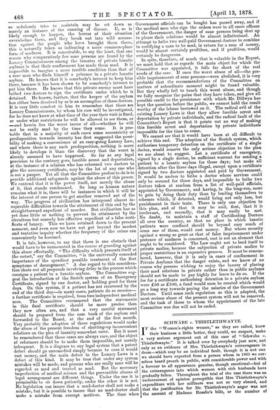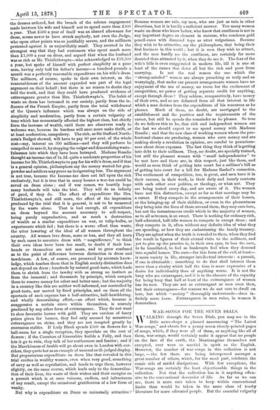SCHWABE v. THISTLETHWAYTE.
IT the "Women's-rights women," as they are called, knew their business a little better, they could, we suspect, make a very serious argument out of this case" of "Schwabe v. Thistlethwayte." It is talked over by everybody just now, not only as an evidence of Mrs. Thistlethwayte's extravagance in dress—which may be an individual fault, though it is not one we should have expected from a person whom in 1865 we our- selves heard preach in public, with considerable power and with a fervour to all appearance genuine, though emotional—but of the extravagance into which women with rich husbands have gradually fallen. Throughout the trial of the case there was an undercurrent of opinion perceptible that Mrs. Thistlethwayte's expenditure with her milliners was not so very absurd, and that the justification for Mr. Thistlethwayte's anger was not the amount of Madame Rosalie's bills, or the number of the dresses ordered, but the breach of the solemn engagement made between his wife and himself not to spend more than 1500 a year. That £500 a year of itself was an absurd allowance for dress, seems never to have struck anybody, not even the Judge, who upon other points was so justifiably severe, and the milliners protested against it as unjustifiably small. They averred in the strongest way that they had customers who spent much more than £1,000 a year on dress, and argued that when the husband was as rich as Mr. Thistlethwayte—who acknowledged to £19,500 a year, but spoke of himself with perfect simplicity as a poor man, having only half his father's income—a hundred pounds a month was a perfectly reasonable expenditure on his wife's dress. The milliners, of course, spoke in their own interest, as the reasonableness of the amount expended was part of the legal argument on their behalf ; but there is no reason to doubt they told the truth, and that they could have produced evidence of extravagance greater than Mrs. Thistlethwayte's. The habit of waste on dress has increased in our society, partly from the in- fluence of the French Empire, partly from the total withdrawal of the Queen's influence which was always on the side of simplicity and moderation, partly from a certain vulgarity of tone which has momentarily affected the highest class, but chiefly from the increase of wealth, until there are observers ready to welcome war, because its burdens will once more make thrift, or at least moderation, compulsory. The rich, as Sir Stafford North- cote's Budget showed, will have to pay 80 per cent. of the whole cost—say, interest on 300 millions—and they will perforce be compelled to save it, by stopping the vulgar and demoralising waste- fulnesses into which they have been betrayed. Madame Rosalie thought an income-tax of is. 2d. quite a moderate proportion of his income for Mr. Thistlethwayte to pay for his wife's dress, and if that is a general opinion, philosophers say the money wasted for gun- powder and soldiers may prove an invigorating loss. The argument is not true, because the Income-tax does not fall upon the rich exclusively, but it is true that in many houses a war-tax could be saved on dress alone ; and if war comes, we heartily hope many husbands will take the hint. They will do an infinity of good, if they do. The effect of expenditure like Mrs. Thistlethwaytes, and still more, the effect of the impression produced by the trial that it is general, is not to be measured by the waste alone. That is bad enough, all expenditure on dress beyond the amount necessary to self-respect, being purely unproductive, and as much a destruction of wealth as a similar expenditure on war, or tulip-bulbs, or experiments which fail ; but there is a worse effect than waste, the utter lowering of the ideal of all women throughout the country. All women love dress, more or less, and they all learn by such cases to associate dress with "magnificence," to think their own ideas have been too small, to doubt if their hus- bands or themselves are not mean, and to grow confused as to the point of difference between distinction in dress and tawdriness. A few, of course, are preserved by accurate know- ledge, which teaches them that in English society distinction does not depend on dress ; hundreds by natural good-taste, which leads them to shrink from the tawdry with as strong an instinct as from the immoral; and thousands by principle, which compels them to reserve money for other and better uses ; but the majority in a country like this are neither well-informed, nor controlled by good-taste, nor moved by fixed principles, and on them all the spectacle of such expense has a half-attractive, half-bewildering, and wholly demoralising effect,—an effect which, because it exaggerates a certain crave within themselves, is scarcely produced by any other form of extravagance. They do not want to shoe favourite horses with gold. They are careless of fancy prices given for houses, they feel only amused by monstrous extravagance on china, and they are not tempted greatly by enormous stables. If Lady Blank spends £500 on flowers for a ball-room for a single reception, they speculate on the cost of
flowers ; if the Countess of Greenshire builds a Folly, and then lets it go to ruin, they talk of her restlessness and fancies ; and if the Marchioness of Arable will go about even in London with out- riders, they quote her as an example of unusual or ill-judged display. But preposterous expenditure on dress like that revealed in this trial excites in wealthy women, even when very good, something of envy as well as reprobation, and tends to urge them, however .slightly, on the same course, which leads only to the demoralisa- tion of their lives, the waste of their wishes and their energies on a pursuit which is at once ruinous, endless, and infructuous of any result, except the occasional gratification of a low form of vanity.
But why is expenditure on Dress so universally attractive ? Because women are vain, say men, who are just as vain in other directions, but it is hardly a sufficient answer. Too many women waste on dress who know better, who know that costliness is not in any important degree an element in success, who condemn gold pencil-cases with diamond tops as utter vulgarisms. Because they wish to be attractive, say the philosophers, that being their first business in this world ; but it is men they wish to attract, and the men hardly see the costliness, are certainly far more daunted than attracted by it, when they do see it. The fear of the wife's bills is even exaggerated in modern life, till it is one at least of the causes that deter all but the rich and poor from
marrying. Is not the real reason the one which the " strong-minded " women are always preaching so truly and so wearyingly, that under our present arrangements women have no enjoyment of the use of money, no room for the excitement of competition, no power of getting separate credit for anything, except through dress ? They seldom, comparatively, have money of their own, and so are debarred from all that interest in life which a man derives from the expenditure of his resources as he pleases. Much of them, no doubt, are mortgaged to the establishment and the position and the requirements of the career, but still he spends the remainder as he pleases. So true do we believe this to be, that rich and independent women are the last we should expect to see spend money with Madame Rosalie ; and that the new class of working women whom the pro- fessional classes are producing, women who earn money and are making slowly a revolution in opinion, are careful to penurious- ness about dress expenses. The last thing they think of is getting into debt to their milliners. They, no doubt, are specially trained, but still the pleasant women with "small independencies" to be met here and there are, in this respect, just like them, and would as soon think of getting into court for a milliner's bill as of getting into court for a bill for Madame Rachel's cosmetics. The excitement of competition, too, is great, and men have it in their careers, in their work, in their daily and hourly contests with each other over politics, or theology, or what not. They are being tested every day, and are aware of it. The women have not this distraction, except so far as that marriage may be a career. If they compete in the arrangements of their homes, or the bringing-up of their children, or even in the pleasantness they bring into the lives of those around them, they may earn love, but not the instantaneous credit which to the majority of women, as to all actresses, is so sweet. There is nothing for ordinary rich, half-educated, half-idle women to compete in except dress ; and they compete in it, often without any definite idea of what they are spending, or how they are embarrassing the family treasury. They are aghast when the truth is revealed to them, when they find the result in figures of their eternal visits to the milliners, and yet to give up the practice is, in their own eyes, to lose the race, to be hutniliated, to feel as bankrupts feel when they descend into squalid homes. The cure—for this form of the evil, at least— is more variety in life, stronger intellectual interests ; a pursuit, if one is obtainable ; something to do that shall interest them more than a rivalry which half the time is more expressive of a desire for individuality than of anything worse. It is not the busy who are extravagant, and it is in the absence of the capacity for being busy that half at least of the extravagance of women has its root. They are not as extravagant as men even then, but their extravagance—for reasons we do not care to dwell on here, but which " society " thoroughly understands—does in- finitely more harm. Extravagance in men ruins, in women it demoralises.



































 Previous page
Previous page